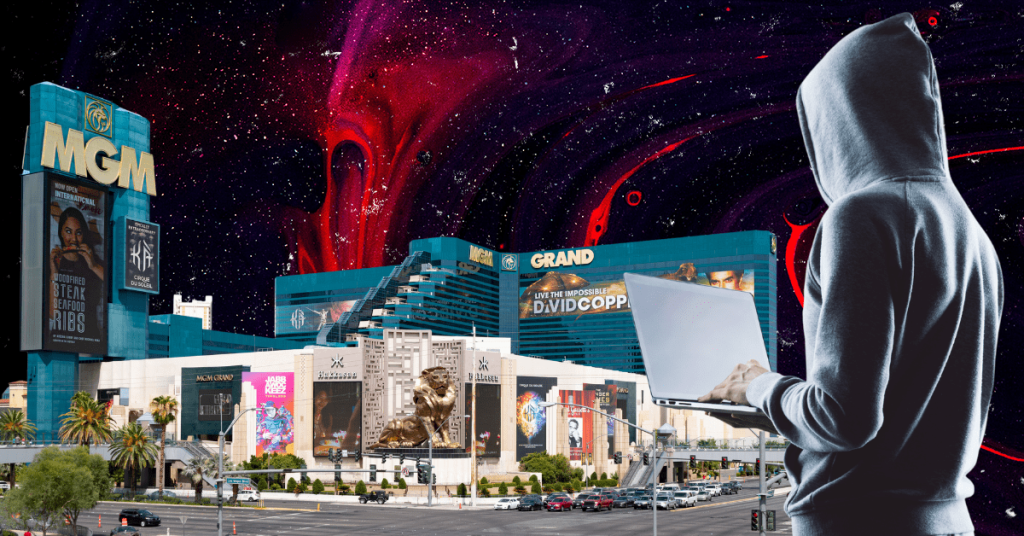When it comes to entertainment, few things are as exhilarating as a night at the casino. The glitz, the glamour, the chance to strike it rich – it’s an experience like no other. But what happens when the very heart of this entertainment empire, a massive casino chain like MGM Resorts, falls victim to a cyberattack? In this article, we’ll take you through the tumultuous events surrounding the MGM casino hack, from its disruptive prelude to the lessons learned from this cybersecurity nightmare.
1. The MGM Cyberattack: A Disruptive Prelude
Imagine checking into a luxurious MGM hotel, ready for a weekend of fun and fortune. But instead of rolling dice and sipping cocktails, you find yourself in the midst of chaos. MGM Resorts, the global giant with over two dozen casino and hotel locations worldwide, was hit by a cyberattack in September. It all started with a “cybersecurity issue” that prompted the shutdown of various systems, plunging the casinos into turmoil. Hotel room keys became digital relics, slot machines sat idle, and even MGM’s websites went dark. Guests faced long lines and handwritten casino receipts as the resort chain scrambled to maintain some level of operation.
2. The Fallout: MGM’s Response to the Cybersecurity Nightmare

As guests grappled with the inconvenience and uncertainty, MGM Resorts provided limited information, offering vague references to a “cybersecurity issue” on Twitter/X. They assured guests that they were diligently working to resolve the problem and keep their resorts open. For nearly ten days, the chaos persisted, with intermittent issues lingering even after normalcy was seemingly restored. MGM Rewards, a vital part of the MGM experience, remained inaccessible for a while, leaving patrons frustrated and concerned.
3. The Long Road to Normalcy: MGM’s Recovery Process
After a painstaking ten-day battle, MGM Resorts finally announced that its hotels and casinos were “operating normally” again. However, they acknowledged the possibility of “intermittent issues” and mentioned that MGM Rewards might not be fully functional. Despite the resumption of services, MGM remained tight-lipped about the exact cause of the initial system shutdown, leaving customers and industry observers in the dark.
4. Personal Data at Stake: The Breach and Its Impact

The breach had far-reaching consequences as the hackers gained access to a trove of personal information belonging to “some customers” before March 2019. This included names, contact information, gender, date of birth, and even sensitive identifiers like driver’s licenses, passports, and Social Security numbers. While MGM did not disclose the exact number of affected individuals, it promised to provide free credit monitoring services – a standard response when companies fail to secure their customers’ data.
5. The Scattered Spider: Unmasking the Culprits
Behind this audacious cyberattack stands a group known as Scattered Spider, with a penchant for social engineering. These hackers excel in “vishing,” the art of infiltrating systems through persuasive phone calls, rather than the more common phishing attacks via email. Scattered Spider’s members, believed to be in their late teens and early twenties, operate from Europe and possibly the US, and their fluency in English adds to the credibility of their vishing attempts.
6. The Dark Art of Vishing: How Scammers Exploit Human Nature
Vishing, a portmanteau of “voice” and “phishing,” preys on the vulnerability of human nature. Unlike other cyberattacks that rely solely on technical exploits, vishing leverages the human element. In this case, the hackers unearthed an employee’s information on LinkedIn and used it to impersonate them during a call to MGM’s IT help desk, ultimately gaining access to the systems. This incident underscores the effectiveness of social engineering, highlighting the importance of safeguarding against it.
7. Ransomware Rears Its Head: The Demands and Denials

Scattered Spider claimed responsibility for the attack, stating that they had stolen and encrypted MGM’s data and were demanding payment in cryptocurrency for its release. Their initial plan was to hack the company’s slot machines, which proved unsuccessful. However, ALPHV/BlackCat, a ransomware-as-a-service operation, denied parts of these claims, including the alleged involvement of teenagers and the slot machine hacking attempt. Despite their responsibility claim, MGM refused to engage with the hackers or pay any ransom.
8. A Widespread Epidemic: MGM and Caesars Hit by Cyberattacks
The MGM casino hack wasn’t an isolated incident. Around the same time, another casino giant, Caesars Entertainment, fell victim to a cyberattack. In a filing with the Securities and Exchange Commission, Caesars admitted that an “outsourced IT support vendor” was the victim of a “social engineering attack.” While this attack shares similarities with the one on MGM, the alleged representative of Scattered Spider denied their involvement. These conflicting reports suggest that the true perpetrators may remain elusive.
9. The Vulnerable Human Element: Lessons Learned from Vishing
Vishing, a known cybersecurity threat, exploits the weakest link in the cybersecurity chain: humans. According to a 2022 IBM report, targeted phishing attacks involving phone calls are three times more effective than those that don’t. Organizations often overlook vishing in employee cybersecurity training, leaving them vulnerable to social engineering attacks. The MGM incident serves as a stark reminder of the need for robust verification processes and comprehensive training to prevent such breaches.
10. Protecting Yourself: Steps to Safeguard Your Data

In a world where even the largest organizations can fall prey to cyberattacks, it’s essential to take steps to protect your data. While individuals can’t control a company’s security measures, they can mitigate potential damage. If you were a patron of MGM during the breach, check your bank statements for any suspicious activity, request a new debit card if necessary, and be cautious of emails purportedly from MGM. Consider freezing your credit to prevent identity theft and stay vigilant against any unusual charges on your credit cards.
The MGM casino hack is a stark reminder of the ever-present cybersecurity threats in today’s digital landscape. While it may feel like something out of a Hollywood heist film on Netflix, the consequences of such attacks are very real. By understanding the vulnerabilities and taking proactive steps to protect personal information, individuals can play a part in safeguarding their digital lives.






